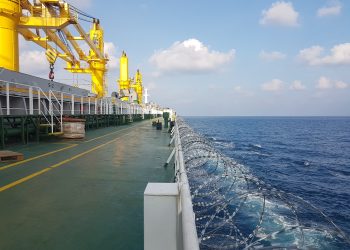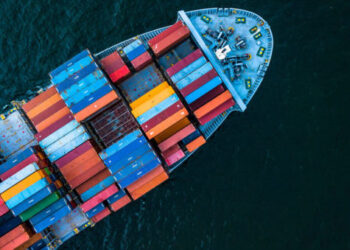Robert Skaare Senior Claims Executive at Gard Club focuses on the damage resulting from over pressurization of liquid cargo tanks during shore pipeline clearing either by line blowing or pigging.
According to Mr. Skaare, over pressurization of vessel tanks when shore pipelines are cleared can cause physical distortion and even rupture of the tanks.
What is more, overfill of tanks during pipeline clearing can also result in pollution or personal injury when product escapes through the pressure vacuum valve. Pre-planning, training and communication between ship and shore reduce these risks.
In addition, all cargo operations must be carefully planned and documented well in advance of their execution. The details of the plans must be discussed with all personnel, both on the ship and at the terminal. How responsibility is to be shared between the ship and terminal must be agreed.
In order to minimize the risks of over pressurization, Gard Club notes the following safety measures:
- Avoid using tanks that that are loaded close to 98% as reception tanks for line clearing and include a safety margin when estimating required ullages for reception tanks to take account of potential inaccuracies in the terminal’s declared “pigging quantities”.
- Consider including provisions for a standby cargo tank to be lined up and ready to be opened should the risk of overfill arise.
- Keep manifold valves closed during idle periods. This will prevent inadvertent over pressurization due to shore error.
- ensure that the vapour return line to shore is open during the operation (when available).
- Monitor the manifold pressure closely and throttle the main manifold valve as required. At the start of the pigging operation, the valve should be opened minimally to control the flow and volume of liquid and propellant gas into the nearly full cargo tank. Gard strongly recommends that only properly trained and experience personnel are assigned duties related to operation of the ship manifold valves.
- Monitor the available amount of cargo tank ullage space and pressure in the tank. If the volume and/or pressure becomes too high, close the manifold valve, and alert the terminal to stop pigging.
- during freezing weather conditions, inspect tank vents (P/V valves) at regular intervals. Some products will freeze and clog the vents thereby creating pressure.
- Close the manifold valves immediately (in agreement with the terminal) once a pig has reached its receiver/trap to avoid compressed propelling gas entering a loaded cargo tank.
- Report immediately to the terminal any abnormalities or deviations from existing procedures.
Awareness of the hazards that arise in clearing of shore pipelines and training for the operation, careful pre-planning with terminal counterparts, and good communication between the ship and terminal personnel reduce the risk of over pressurization and overfill when completing cargo operations by clearing the shore pipeline.
…Robert Skaare concludes.































































